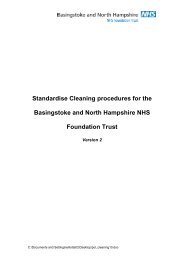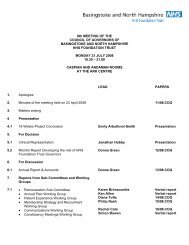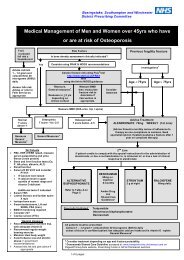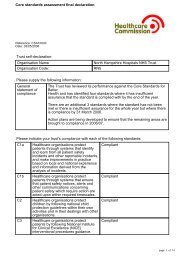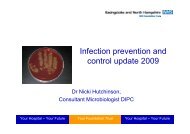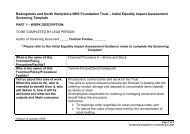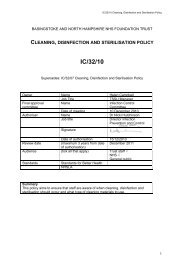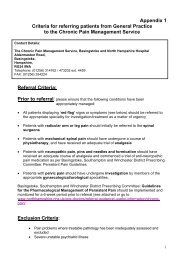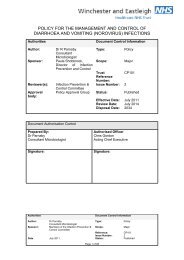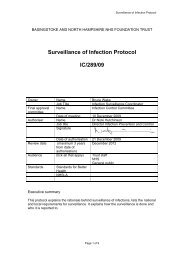Isolation and infectious diseases policy - Hampshire Hospitals NHS ...
Isolation and infectious diseases policy - Hampshire Hospitals NHS ...
Isolation and infectious diseases policy - Hampshire Hospitals NHS ...
You also want an ePaper? Increase the reach of your titles
YUMPU automatically turns print PDFs into web optimized ePapers that Google loves.
Winchester & Eastleigh Healthcare <strong>NHS</strong> Trust<br />
Policy for <strong>Isolation</strong> <strong>and</strong> Infectious Diseases Policy<br />
<br />
<br />
E-learning for infection prevention <strong>and</strong> control is an acceptable alternative<br />
on alternate years once face to face induction is completed. E-learning is<br />
accompanied by certification which can be used in evidence at appraisal.<br />
Completion of the Infection Prevention <strong>and</strong> Control booklet can also be<br />
carried out on alternate years, available from the Education & Training<br />
Department.<br />
16 MONITORING COMPLIANCE WITH THIS POLICY<br />
18<br />
Authorities<br />
It is important to minimize the risk of the spread of infection to <strong>and</strong> from patients<br />
<strong>and</strong> staff. This <strong>policy</strong> outlines the measures, which should be taken to prevent<br />
the spread of infection from patients who are known to be a potential source of<br />
infection.<br />
This will be monitored by:<br />
Monitoring the trends of infections in the Trust by analyzing alert<br />
organism figures.<br />
Ensuring when isolation of infected patients cannot occur that clinical<br />
incident forms are filled in.<br />
Site coordinators collecting data when patients cannot be isolated.<br />
Monitor that the correct signage <strong>and</strong> isolation guidelines are adhered to<br />
by all staff by undertaking ad hoc observational audits during ward<br />
visits.<br />
Ensuring that non compliances to <strong>policy</strong> are challenged appropriately<br />
by any member of staff <strong>and</strong> not left. Any complaints must not be<br />
discriminated against.<br />
Compliance with this <strong>policy</strong> should be audited regularly by bed<br />
managers or divisions <strong>and</strong> noncompliance reported divisionally <strong>and</strong> to<br />
the Infection Prevention <strong>and</strong> Control Committee. The IPCNs will<br />
facilitate the audit process if required.<br />
There is a regular programme of audits, led by the DIPC <strong>and</strong> coordinated<br />
by the IPCT, which are reported to the Infection Prevention<br />
<strong>and</strong> Control Committee (IPCC), e.g. H<strong>and</strong> Hygiene, use of <strong>Isolation</strong><br />
facilities, infection control <strong>policy</strong> compliance, High Impact Interventions.<br />
Divisional audits are reported via the divisions to the IPCC <strong>and</strong><br />
Divisional Governance Committees<br />
Alert organism surveillance <strong>and</strong> trends are reported to the IPCC<br />
M<strong>and</strong>atory surveillance is reported to the IPCC, divisions <strong>and</strong> Trust<br />
Board.<br />
Serious Incidents Requiring Investigation (Infection) are discussed at<br />
Document Control Information<br />
Author:<br />
Sponsor:<br />
Date:<br />
Dr Kordo Saeed<br />
microbiologist<br />
Sue Dailly Lead Nurse<br />
Infection Prevention <strong>and</strong><br />
Control<br />
Paula Shobbrook Director of<br />
Infection Prevention <strong>and</strong><br />
Control<br />
01/08/11<br />
Type:<br />
Scope:<br />
Reference:<br />
Issue No:<br />
Status:<br />
Policy<br />
Major<br />
CP022 (IC 04)<br />
4<br />
Published



